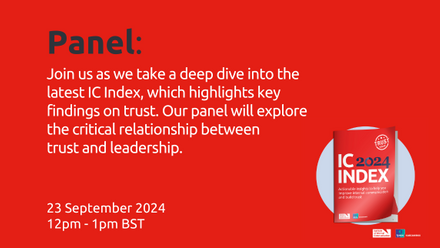When disaster strikes a business, it is often the consumer who sees the fallout. Worse, while companies often have protocols to mitigate internal issues, consumers may not have the support, resources, or guidance they need to respond effectively. This is where a commitment to effective risk communication comes into play.
We're going to take a look at how important it is to maintain risk comms in business. What impact can it have and what should you be implementing to make it work effectively?
A Matter of TrustWhatever industry you're in, you need your consumers and other stakeholders to have the confidence that you are acting in ways that have their interests in mind. Indeed, a recent study found that the majority of consumers consider transparency more important than price when making engagement decisions. At its most basic level, communication of potential and present risks helps to show your company considers it a part of your values to ensure the consumer has the support they need to make informed decisions.
Conversely, too many business owners take the position that communication of risk may damage the company's reputation. As a result, they either fail to communicate a risk at all or provide insufficient emphasis on its seriousness. You cannot hope to build trust in this way. Yahoo is a prime example of this. In 2013 and 2014, they announced data breaches that they said affected around 500 million users. However, it was revealed in 2017 that the breaches affected all 3 billion of its users and that leadership had known the full extent all along but failed to communicate it. As a result, the company faces not just greater litigation, but also damaged consumer trust in their brand.
Alongside demonstrations of corporate social responsibility, authenticity is a priority for consumers in the contemporary commercial environment. This is also essential for making certain that your company can respond honestly and effectively to a crisis. Remember, openness about risk not only shows you can be trusted to overcome it, but it also allows everyone to be a part of the solution.
Reaction and RecoveryDisaster isn't always within your control, but how you react and recover certainly is. Your approach to risk communication is a vital part of making sure that you are better equipped to handle the immediate impact of an event and turn the tide to come out of it positively.
One of the things you must understand and accept about business risk management is that each company will have its own specific set of issues that could impact them — not all enterprises are the same, after all. There may be physical risks in the type of work you perform, location risks specific to your geographical region, even common technology risks like power failure or wifi outage may uniquely impact your operations. Though your response will be dependent on the challenge, the one common thread that runs through all of these is that communicating it to all stakeholders must be part of your immediate response. Even if you do not know the full extent of the damage yet, communicate this. Your immediacy helps to demonstrate that while something has gone wrong, you are ahead of the situation and have plans to handle it. This in turn allows them to respond accordingly.
However, your risk communication doesn't just halt at an initial announcement of an issue. An important part of regaining public trust, and indeed their ongoing support, is keeping them honestly apprised of the situation. Build their confidence by giving detail on the expertise you're applying and your recommendations for their own actions. With each communication you make, let them know also when you intend to issue the next update — set expectations for keeping stakeholders in the loop.
Advanced CommunicationsRisk communication shouldn't always be a reactionary activity. Rather, it can be a route to improving business operations and relationships with your consumers. As such, it's worth taking the time to consider how you can bring the conversation about risk and handling it into the ongoing process of your operations.
One approach is gaining a full understanding of what risks can be present when you're preparing to present a new product to the market. This is especially important where the software launches are concerned. In the months leading up to your launch take the time to fully investigate the extent of the bugs in your product. Bug bashing can be a good route toward this, where you bring multiple members of staff together to explore every aspect of the software. Even if you're unable to take care of all the bugs identified before the launch, you can still present your findings to consumers, making them aware of potential bugs and combining this with information on how to alert you of issues and what your plans are to make improvements.
Your advanced risk communications can also be part of your marketing and even social media posts. Inform consumers about aspects you feel might be a source of disruption. If you live in an area that sees a lot of extreme weather, you can make posts that discuss recent weather forecasts and how that might impact your business. Invite a dialogue on this too, as your consumers will have concerns and even insights of their own that can bolster your approach.
No business is without risks, it's how you treat these that matters most. Keeping everyone in the loop — consumers, partners, staff — helps to engender trust and ensures that everyone can be involved in overcoming obstacles. With some commitment to regular discussions, your business can maintain solid relationships.






